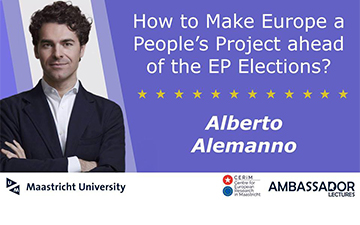Jean Monnet lecture by Alberto Alemanno
Together with the Ambassador Lectures of Maastricht University, CERIM organises the second Jean Monnet Lecture of this academic year. Professor Alberto Alemanno will provide a talk entitled ‘How to Make Europe a People’s Project ahead of the next EP Elections?
Professor Alemanno is an engaged academic and educator, a civic advocate and social entrepreneur. He is known for his scholarship and public interest work on the democratization of the European Union and on the use of law for positive social impact. Due to his commitment to close the gap between academic and policy action, Professor Alemanno was named Young Global Leader by the World Economic Forum and one of the 40 under 40 European Young Leader. Currently, he is the Jean Monnet Professor of EU Law at HEC Paris, visiting professor at the College of Europe and the founding director of the EU Public Interest Clinic at New York University School of Law in Paris.
Alemanno has been advocating – for almost two decades – for the creation of a pan-European political space transcending the boundaries of the nation-state. This is required not only by the nature and scale of many of the challenges facing Europe, such as migration, but also by the growing social and economic interconnectedness experienced by Europeans. Nonetheless – he argues – EU politics largely remain stuck in national silos: instead of holding a single search for a solution across the bloc, national debates promote local ‘solutions’ that are inefficient and often at odds with one another, as in the case, again, with migration.
Seen from this perspective, the next European Parliament elections due in May 2019 can be seen as a break or make it moment for Europe. Next year’s election could indeed mark a turning point, the moment when the first genuinely European political competition paved the way for a genuinely European transnational democracy.
During the Jean Monnet lecture Professor Alemanno will speak about what to expect from the next European elections, by focusing in particular on the embryonic emergence of transnational politics. He expects the ongoing realignment of the European political space to fundamentally reshape our current vision of the EU, by accommodating new transnational movements closing the democracy gap, and offering more effective, truly European solutions for tackling the EU’s most pressing crises.
Registration for the lecture is not necessary but you are advised to be on time.
